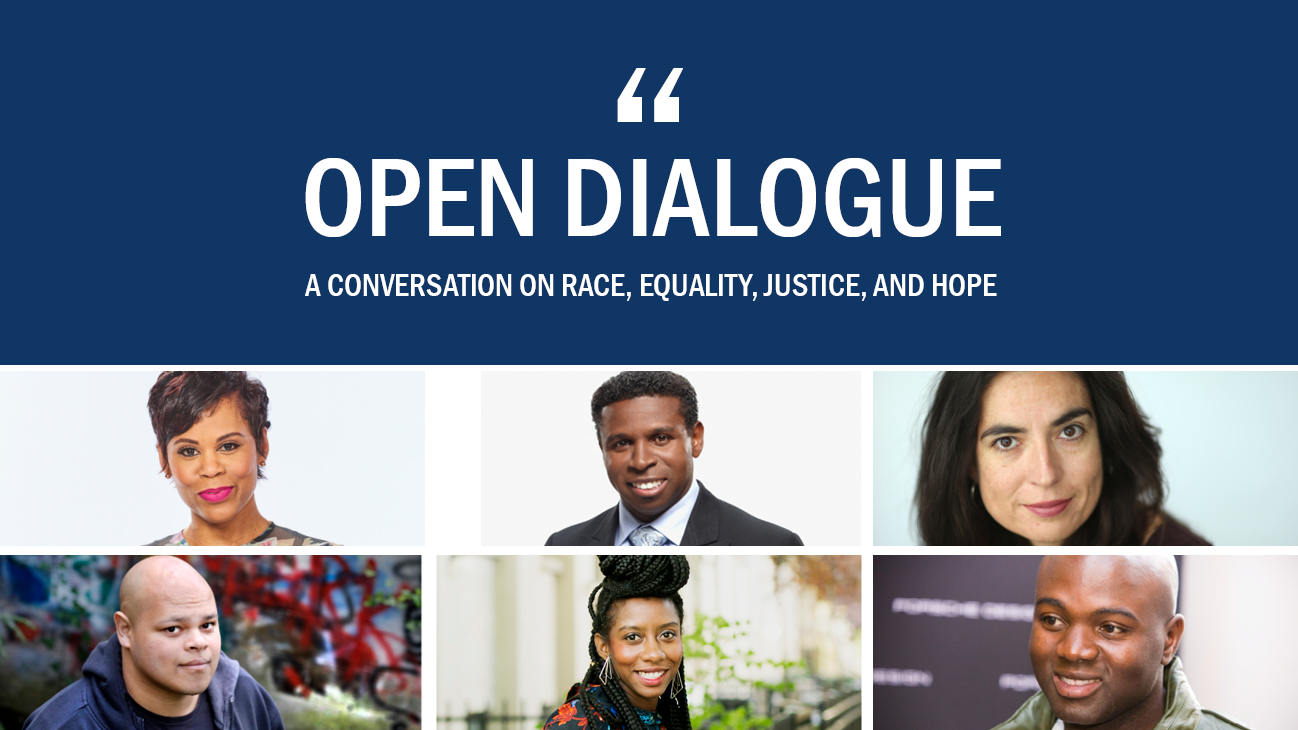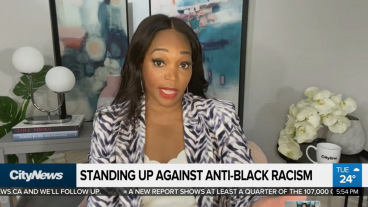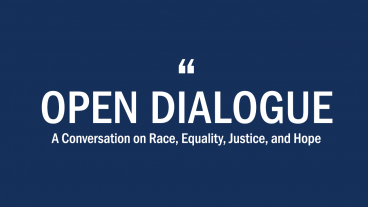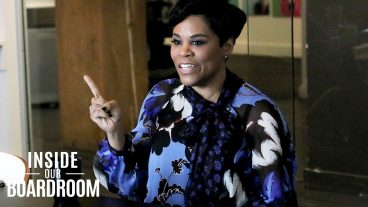This week, we hosted an incredibly important virtual event — an open dialogue on race, equality, justice, and hope, with over 2,000 clients and guests in attendance. Host and moderator, Marci Ien welcomed panelists Michael “Pinball” Clemons, Tanya Talaga, Jamil Jivani, Dr. Hadiya Roderique, and Orlando Bowen to shed some light on the challenges and possible solutions facing us today, and what individuals and organizations can do right now to help make our society better for everyone.
Marci moderated a raw and intimate conversation on the racial inequality that permeates our society today at all levels — from education to the workplace, policing to newsrooms — and the very real impact this has on all of us. The speakers drew on their personal and professional experiences with racism as well as the events occurring right now, both in Canada and the US, that have sparked so many conversations over the past few weeks.
We’ve included below just some of the powerful messages each speaker shared, and we encourage you to watch the full recording of the event.
To ensure that as many people as possible are included in this important conversation, we uploaded the full video on YouTube and encourage you to post it on your social media channels (using #OneVoiceOneTeam), and share it with your friends, family, and colleagues. It is critical that this important conversation continues well beyond today, so the change that needs to take place, does in fact happen.
You can also show your support by donating to these organizations in support of Black and Indigenous lives today, tomorrow, and forever.
Marci Ien:
I’m wondering whether we feel as a group that we’re in a moment right now, and a moment that could precipitate change, and I ask this because my dad who immigrated to Canada from Trinidad some 60-something years ago, went to school in Boston at the height of the civil rights movement. In speaking to him these last couple of days, he really feels that this is similar. It feels the same way, and he feels that the difference right now is that the crowds, as Orlando alluded to, are more diverse. People are marching together and that’s not something he necessarily saw back in the 1960s all the time.
Michael “Pinball” Clemons:
To be pro status quo is to be anti-black; to be pro status quo is to be anti-indigenous. At this time, if you don’t see it, you are anti-black, you are working against me, if you are pro status quo if you want things to stay the same…
Progress doesn’t mean paying attention to this for a little while. This whole idea of equality is not the first stop, that’s just not a reality because you can’t legislate love. What we should be looking for is fairness. Hadiya talked about some of the statistics and statistically we can look and say, “okay, this is balancing out better.” So, in other words, at this point, we should be pushing for more fairness. Equality is not close, we are not in shooting range there, but we can move towards fairness and as we move towards fairness, some day we can look forward to that concept, that ideology, of equality.
Tanya Talaga:
There is a quiet racism that runs through this country when it comes to Indigenous people and it has always been there. It is systemic, and it just there all the time. You see it in newsrooms, in schools…
Indifference harms us. Indifference is just as awful as loud racists shouting at the top of their lungs. Indifference can kill. This is a time we can all grab and unify and work together. Because when you look at progress throughout society, and changes in society, they never came because we waited on time. They never came because we were silent, it’s because we pushed forward with progress.
Jamil Jivani:
Regardless of where the US is, even on other issues like healthcare, we don’t say, “well our healthcare system is better than theirs”, we still expect it to be good. And on something like racism, we need to have the same perspective, which is regardless of what’s happening in the US, we still have our ideals and we should be working towards those ideals and no other comparison point should take us away from that…
My hope is that we understand that we can’t let the US news cycle determine how enthusiastic and committed we are in addressing these issues.
Dr. Hadiya Roderique:
I’m going to speak directly to employers right now, that’s my wheelhouse. I want to remind you that you do not exist in a vacuum. And I think too often, workplaces are silent about racial inequities and their impact… this silence right now is being interpreted in a number of ways from indifference to acceptance, and that is not ok.
Race and racism are at the heart of many of the systemic and longstanding problems we have in the workplace, and conversations about race and racism need to happen in a comprehensive and authentic way. Fixing issues like this is going to take hard work over a long period of time, and you need to have a cultural shift. Right now what I see a lot of, is that instead of people doing the hard work, they want quick fixes, they want statements, because thinking about racism and how it is perpetuated by your leadership in your company daily — because it is happening daily — is uncomfortable and people do not want to constantly be uncomfortable. But this is the time to be uncomfortable and you will grow from this discomfort.
Orlando Bowen:
Wherever you are, when I say “one voice” I’m going o invite you to say “one team” but with a lot of passion. One voice, one team. It’s going to take all of us doing everything we can with what we have, in the moments and spaces we have.
There is an Augustine of Hippo quote that I love, “hope has two beautiful daughters — anger and courage. Anger at the current situation and the courage to do whatever you can with what you have to change it.” So, I believe that if we wrap arms around each other, link arms, anything is possible and now is the time.
About the Speakers
 Michael “Pinball” Clemons is a CFL legend, the general manager of the Toronto Argos, and founder of the Pinball Clemons Foundation — a non-profit organization that empowers youth through education.
Michael “Pinball” Clemons is a CFL legend, the general manager of the Toronto Argos, and founder of the Pinball Clemons Foundation — a non-profit organization that empowers youth through education.
 An award-winning writer, and the First Ojibway woman to deliver the CBC Massey Lectures, Tanya Talaga shares global Indigenous stories in hopes of building a more inclusive and equitable future.
An award-winning writer, and the First Ojibway woman to deliver the CBC Massey Lectures, Tanya Talaga shares global Indigenous stories in hopes of building a more inclusive and equitable future.
 A lawyer, community organizer, and teacher, Jamil Jivani is the founder of the Citizen Empowerment Project, which leads initiatives related to policing, racial profiling, democratic participation, and more.
A lawyer, community organizer, and teacher, Jamil Jivani is the founder of the Citizen Empowerment Project, which leads initiatives related to policing, racial profiling, democratic participation, and more.
 Dr. Hadiya Roderique delivered a wake-up call in her Globe and Mail essay, “Black on Bay Street.” With a Ph.D. in organizational behaviour, she explores how race, gender, and parenthood shape the workplace.
Dr. Hadiya Roderique delivered a wake-up call in her Globe and Mail essay, “Black on Bay Street.” With a Ph.D. in organizational behaviour, she explores how race, gender, and parenthood shape the workplace.
 Over ten years ago, then-CFL linebacker Orlando Bowen endured a savage beating from two plainclothes police officers. Today, he empowers others to overcome adversity, find their passion, and use their gifts to serve.
Over ten years ago, then-CFL linebacker Orlando Bowen endured a savage beating from two plainclothes police officers. Today, he empowers others to overcome adversity, find their passion, and use their gifts to serve.
About the Host
 Deeply committed to humanitarian causes, Marci Ien was the co-host and news anchor of the national morning program, Canada AM, for 15 years. Today, she is a co-host on CTV’s The Social.
Deeply committed to humanitarian causes, Marci Ien was the co-host and news anchor of the national morning program, Canada AM, for 15 years. Today, she is a co-host on CTV’s The Social.




